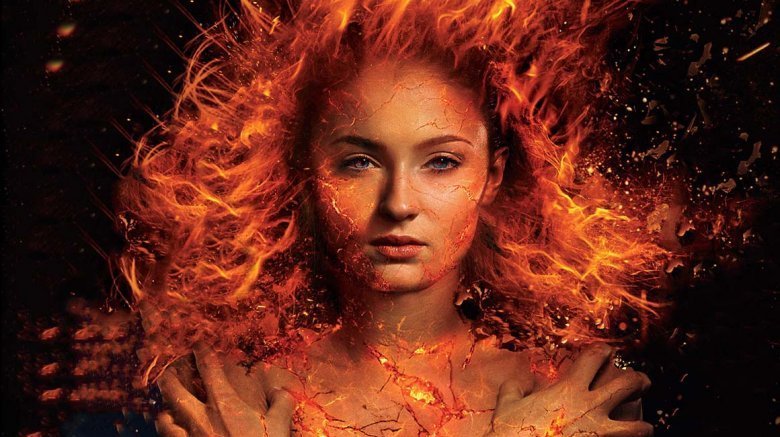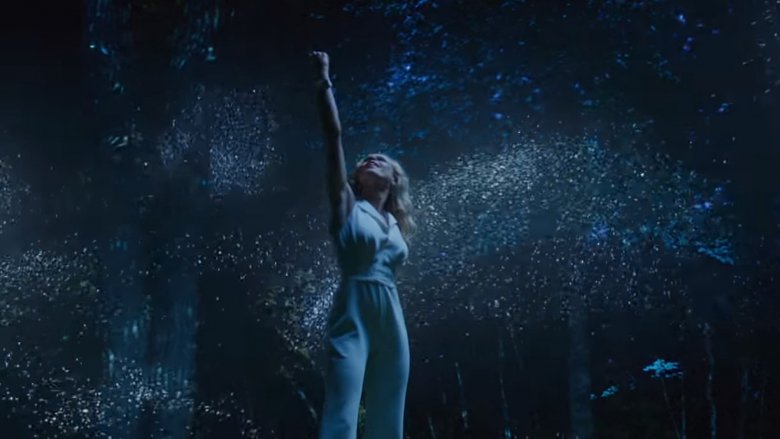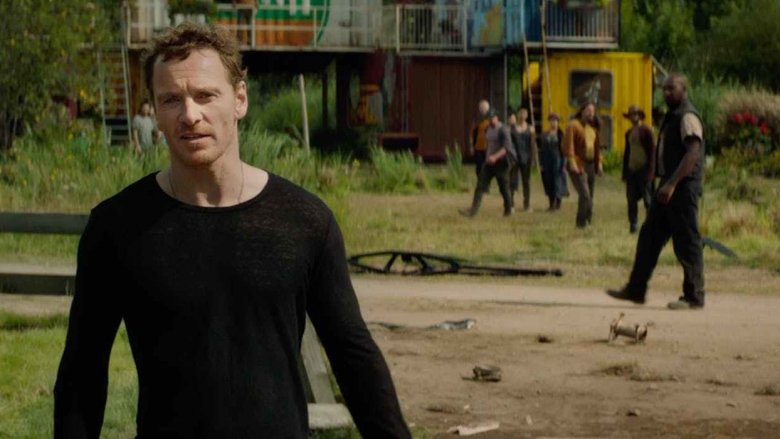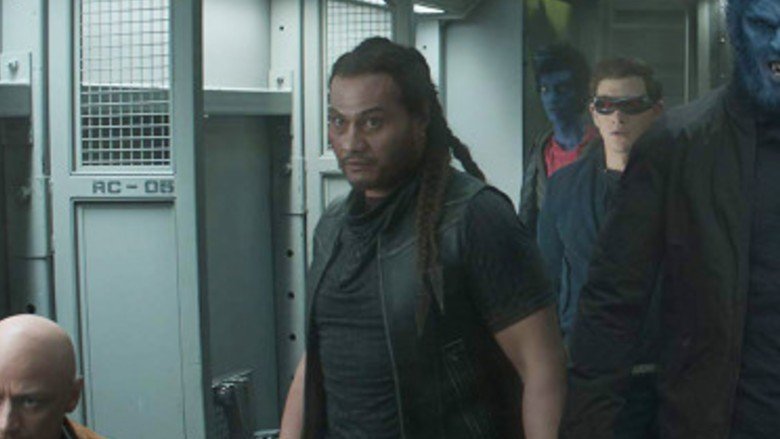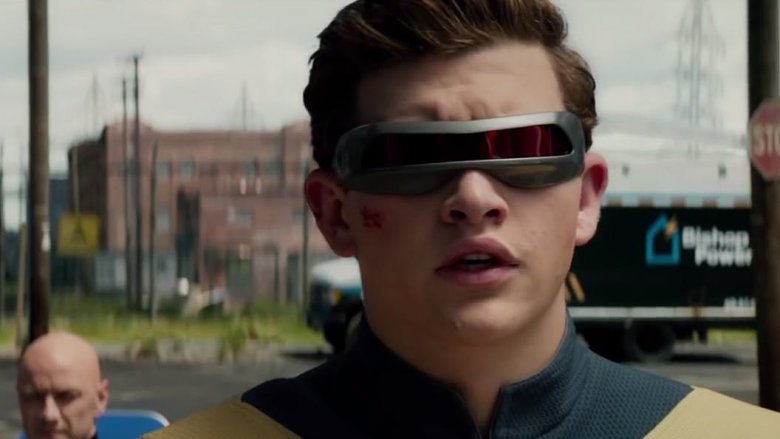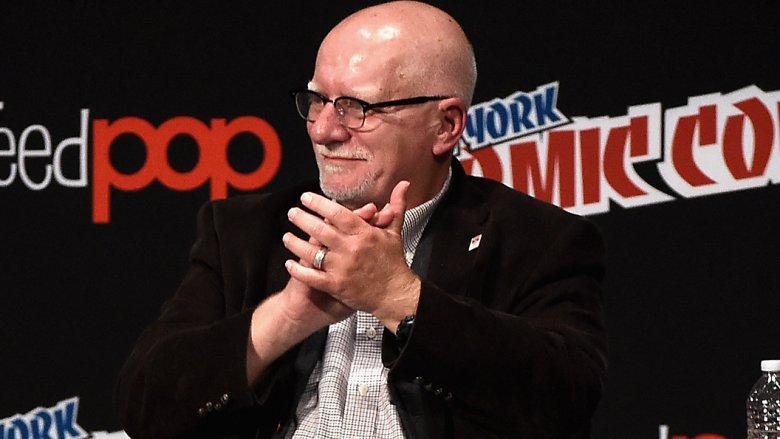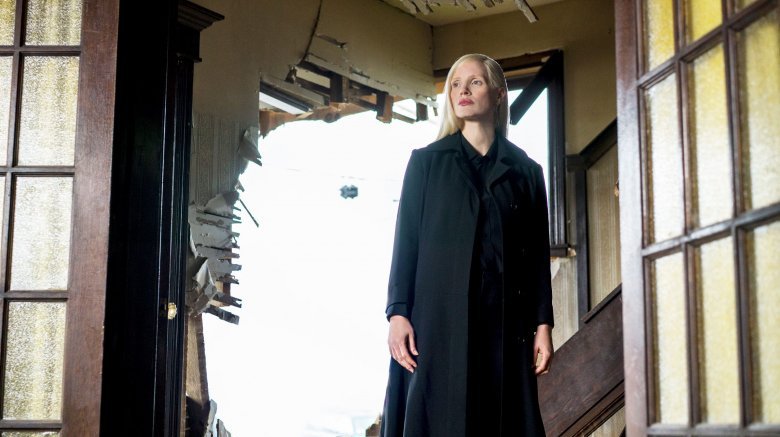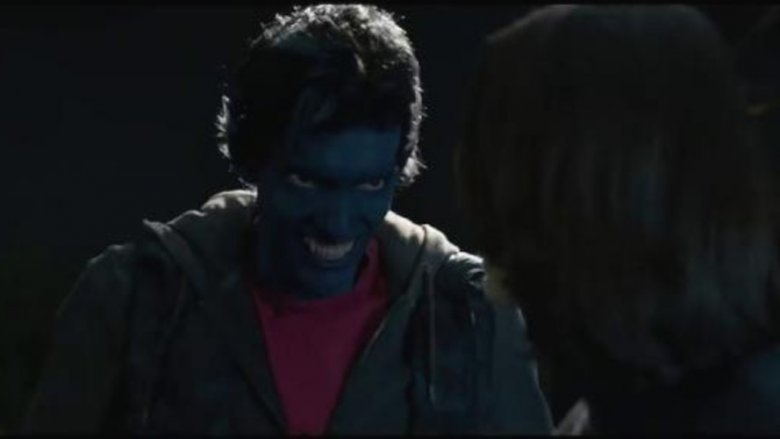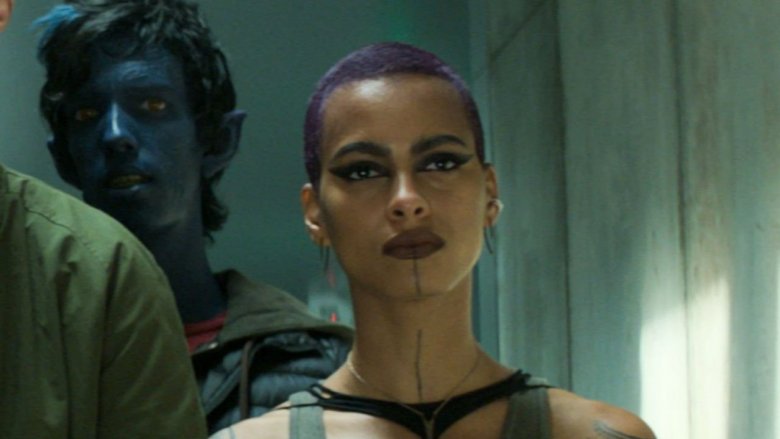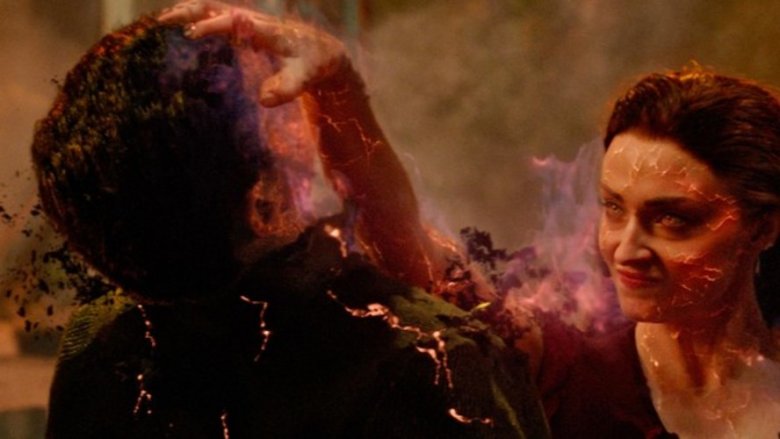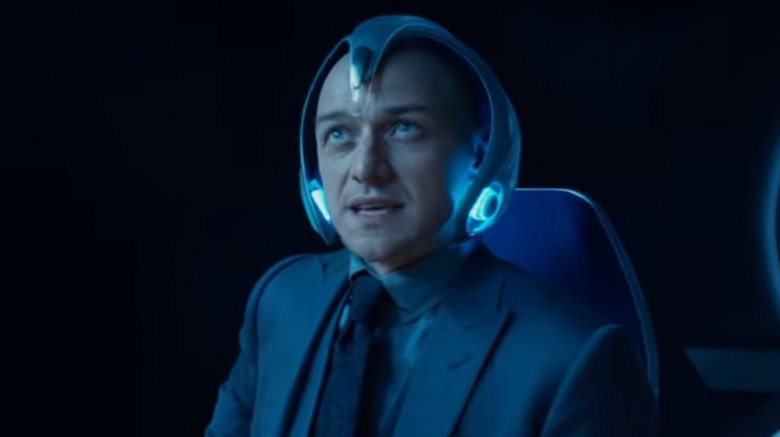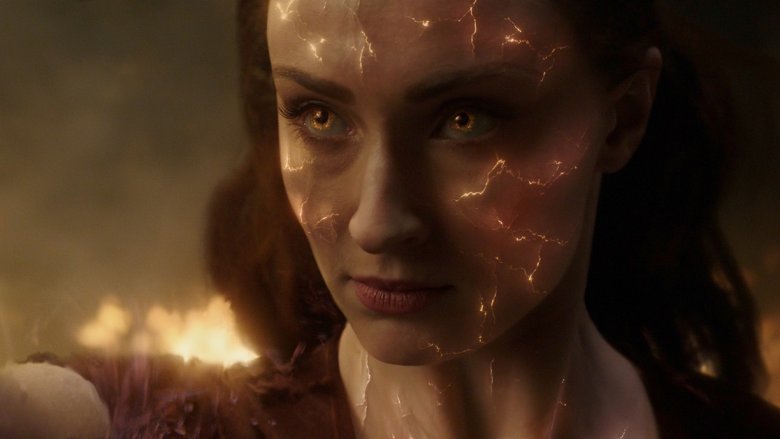Dark Phoenix Characters With More Meaning Than You Realize
Well, it's finally here. Dark Phoenix — the last installment of Fox's two-decade old X-Men franchise — is on the big screen and we can see where Charles Xavier's students land at the end of the franchise.
The X-Men mythology is a rich one with dozens of super-powered heroes, villains, and everything in between. For the franchise's entire history the filmmakers took full advantage of that mythology to not only help build the fictional world of these outcast heroes, but to pay tribute to the comics inspiring the films and let the hardcore fans know there are plenty of fans behind the camera too. One of the ways they did that was to sprinkle the stories with characters instantly familiar to comics fans who were otherwise inconsequential to the plot. For example, while Colossus (Daniel Cudmore) had little screentime in X2: X-Men United, you can bet when he armored up to fight off the soldiers invading the school, the old school fans were cheering. The same could be said of Kitty Pryde (played by various actresses) who phased through walls and floors and soldiers in the first two X-Men films, but didn't get close to center stage until Elliot Page took the role in X-Men: The Last Stand.
Dark Phoenix continues this tradition, bringing in heroes and villains familiar to the comics fans as well as referencing classic stories. With a warning that spoilers do follow, here are the characters we spotted in Dark Phoenix with more meaning than you realize.
Dazzler
After the X-Men save the endangered astronauts in the beginning of Dark Phoenix, students and staff celebrate outside. A beautiful young woman with long blonde hair and striking blue eye markings sings for the school. As she sings, a cloud of sparkling lights spins in the air around and above her, choreographed by an unseen source.
The singer is Alison Blaire, a.k.a. Dazzler (Halston Sage), a mutant who can transform sound into light. In the comics, she uses her gift primarily to push her singing career forward. When she's been a part of the X-Men, she's used them in more creative ways — like to blind enemies or to attack with bolts of hard light. It's fitting Dark Phoenix is the film that introduces her, considering the Dark Phoenix comics storyline. We're introduced to her when the X-Men attempt to recruit her in 1980's Uncanny X-Men #130.
Dazzler is an interesting figure in Marvel's history. She was originally conceived — as Sean Howe puts it in his 2012 book Marvel Comics: The Untold Story — as "an ambitious cross-pollination project." Initially named "The Disco Queen," the hero would appear in Marvel Comics, and then Casablanca Records would find a singer who would take on the persona of the hero and produce an actual record. A lot of things went wrong, which former Marvel Editor-in-Chief Jim Shooter writes about on his blog, and Dazzler went from being an interesting media experiment to a D-lister mostly on the periphery of Marvel's narrative.
The people of Genosha
After Jean (Sophie Turner) kills Mystique (Jennifer Lawrence), the troubled hero travels to a remote island. What initially appears to be some kind of commune reveals itself as Genosha, a place that we learn was given to Magneto (Michael Fassbender) and other mutants as a homeland.
Genosha is taken directly from the comics, though there are significant differences. In the comics, Genosha begins as an island nation ruled by humans where mutants are enslaved by the government and their abilities are used to serve the state. In the 1990 comics event X-Tinction Agenda, the X-Men, X-Factor, and the New Mutants join forces and topple Genosha's corrupt government. In 1999's X-Men #87, the United Nations gives the country to Magneto as a mutant homeland; under his leadership, it grows to be something much larger than what we see in Dark Phoenix. In 2001's New X-Men #115, the mutant-hunting killing robots called the Sentinels wipe out almost Genosha's entire population — which by that point is around 16 million.
There are attempts by Magneto and others to rebuild Genosha, but so far little has come of it. It has mainly served as a site for large superhuman battles, serving only to render the place more uninhabitable.
Ariki -- the hair guy
One of Dark Phoenix's more mysterious minor characters is Ariki (Andrew Stehlin). He's one of Magneto's Genoshan followers and one of the mutants Magneto brings with him when he attempts to kill Jean Grey. His powers revolve around his long hair, which he can control and use to grapple or strike opponents. While he's initially an enemy of the X-Men, he's arrested with the heroes and fights alongside them in their battle against the D'Bari aliens on the train meant to bring them all to some kind of mutant containment facility.
Ariki is mysterious for a few reasons. First, and perhaps most notably, he doesn't appear in the comics. There are no X-Men, X-Men enemies, or other Marvel heroes with the name Ariki. Second, it was initially reported Stehlin would be playing a different character. When IGN reported on the casting of Stehlin and Kota Eberhardt in September 2018, Stehlin's character was identified as Red Lotus — an Australian-Chinese character who appears in early aughts issues of X-Treme X-Men — whose powers have nothing to do with hair manipulation.
Third and finally, Ariki's fate in Dark Phoenix is unknown. We don't see him killed by the D'Bari but, after Jean lifts the train off its tracks and most of the X-Men emerge from the wreckage, Ariki isn't among them. Was this a film-editing mistake? Is it possible he was killed so abruptly that blinking during the scene made us miss it?
Cyclops
If there are any crimes the X-Men franchise can be accused of in general, its poor treatment of Scott Summers would be near the top of the list. In 2000's X-Men he was portrayed as a snotty jerk who has the audacity to save Wolverine's (Hugh Jackman) life, have a girlfriend Logan was attracted to at the same time, and for some strange reason be bothered by someone he just met stealing his motorcycle. When it came time to kill him in 2006's X-Men: The Last Stand, director Brett Ratner didn't even bother to do it onscreen.
More than anyone save Jean herself, no one in the X-Men will be more changed after the events of Dark Phoenix than Scott. As someone whose emotions are already pushed down because of his fear of his tremendous power, the fate of Jean Grey (who Scott believes is dead) will only prove to Scott just how dangerous unchecked power will be. He'll likely withdraw deeper into himself.
The writer
When Professor X (James McAvoy) makes a speech after receiving an award from the President (Brian d'Arcy James), one of the White House's guests is Chris Claremont.
Claremont is not one of the X-Men's creators — that was Stan Lee and Jack Kirby. However, Claremont is a writer whose work on the X-Men comics helped to make them the household names they are now. He stayed with the team longer than most writers stay with a single title: He started writing X-Men in 1975 and didn't leave the franchise until 1991. When X-Men got big enough to warrant spinoffs, it was usually Claremont who was writing them. He wrote the first Wolverine miniseries with Frank Miller, and when Logan finally got his own ongoing series, Claremont was its first scribe. Likewise, he was the first scripter to tackle New Mutants and the British X-team Excalibur.
While there have been plenty of landmark X-Men stories in the comics long after Claremont left the books, the foundation for much of what we see in the films was established by Claremont. It was during his run that characters like Wolverine, Nightcrawler, Colossus, Storm, and Kitty Pryde were introduced to the team. It was Claremont who introduced the idea that Magneto is a Holocaust survivor and that his actions stem from his horrific experiences during that time. Of course it was Claremont and collaborator John Byrne who crafted the Dark Phoenix saga.
Vuk, a.k.a. Starhammer
There was a lot of mystery surrounding Jessica Chastain's character leading up to the release of Dark Phoenix. We now know Chastain's character is literally from out of this world: She plays Vuk, a member of the nearly extinct extraterrestrial race the D'Bari. She siphons part of Phoenix's power from Jean Grey, but eventually is destroyed before Jean takes to the stars.
While she's not exactly an A-List bad guy, Vuk is one of Marvel's oldest supervillains — though in the comics, she is a he. Making his first appearance way back in 1964's Avengers #4, Vuk turns the Avengers to stone on the order of Namor the Sub-Mariner, who promises to retrieve Vuk's crashed spaceship in return. Little was heard from the character until Dark Phoenix destroyed his homeworld in 1980's Uncanny X-Men #135. He's since made sporadic appearances using the name Starhammer, and is usually intent on getting revenge on Phoenix for what happened to his people.
Dark Kurt
By the end of Dark Phoenix, we see a side of Nightcrawler (Kodi Smit-McPhee) we're not used to, and it's interesting to consider where the character would have wound up if more Fox X-Men movies were on the horizon.
The teleporter is clearly not ready for what he experiences in Dark Phoenix. He suffers terrible guilt when he's forced to leave Jean behind in the space shuttle. Once Jean goes bad, the blue elf is helpless against her. Phoenix beats him up a couple of times, and she doesn't pull her punches. In the battle against Magneto and his followers in New York City, Nightcrawler is stressed to his limits as the rest of the team is constantly calling on him for aid. When a guard who is trying to help him is killed by one of the D'Bari on the prison transport train, Kurt finally snaps and we see an uncharacteristic viciousness break free from the mutant. He uses more brutal tactics than we've ever seen from him, ultimately teleporting one of the D'Bari to the train tracks, giving her an evil grin, and teleporting away before the approaching train kills his enemy.
Dark Phoenix is the last of the Fox X-Men films, but if it weren't, then you can bet we'd see some consequences to Kurt's dark turn in the follow-up.
Selene, the Black Queen
We don't see or hear much from Selene Gallio (Kota Eberhardt) in Dark Phoenix. We know she's damn good with knives and that she boasts psychic powers strong enough at least to hold Professor X at bay. And we know in spite of her earlier mission of murdering Jean, she sacrifices herself heroically fighting the D'Bari.
The Selene of the source material is much more complex than she appears in Dark Phoenix. In Marvel's comics, she was once known as the Black Queen of the Hellfire Club — we saw a version of the club in 2011's X-Men: First Class. She's one of the world's most powerful mutants, in part because of her wide range of powers. She can suck the life force out of others to make herself stronger; along with the telepathic powers she shows in Dark Phoenix, she's also telekinetic, and she's very tough to kill. No one knows how long she's been alive, only that's it's been for millennia.
She's also a magic practitioner, which not only makes her an even more formidable opponent, but also renders her tougher to pin down. No one is quite sure which of her abilities spring from her genetic mutation, and which are the result of magic. All anyone's sure of is that, unless no other options present themselves, if she's somewhere it's a good idea to be somewhere else.
The D'bari no more
By the end of Dark Phoenix it seems likely the D'Bari are extinct. When Vuk first meets Jones (Ato Essandoh), she refers to him and his D'Bari as all that remains of her people. If this is true, and if Jones brought all of those D'Bari with him to the prison transport train, then the D'Bari are no more. The few who survive the train battle are killed by Phoenix at the end, as is Vuk.
It's interesting that their extinction is not dealt with as a more important consequence. We don't know exactly how much Xavier learns when he reads Vuk's mind, but it's safe to assume he knows about the species' dwindling numbers — though we never learn of him sharing this with the rest of the X-Men.
If Xavier does know the D'Bari are almost extinct, then it means a group of heroes dedicated to preserving its people does so by (in Charles' case, at least) knowingly wiping out another. It's a dark irony for an X-Men film, and it's something that isn't mentioned at all once the final battle is done.
The manipulator
More than any other X-Men film, Dark Phoenix reveals the secrets and shameful manipulations in the life of the seemingly benevolent Professor X.
We eventually learn that not only did Xavier lie to Jean when he told her that her father was dead, but that without anyone else's knowledge — including her own — he placed psychic blocks in her mind to protect her from traumatic memories, blocks that the Phoenix Force begins to tear down once it inhabits Jean's form.
The fact that Xavier can be a manipulative jerk is nothing new to comics fans. Over the years characters who were once almost fanatically loyal to Xavier, like Cyclops and Logan begin to lose trust in their mentor. In one of the more infamous examples of Professor X's dishonesty, during Joss Whedon's run on Astonishing X-Men, Xavier confessed to have kept a slave for years. When the X-Men's technologically miraculous Danger Room comes alive and attempts to murder the team, it comes to light that Professor X knew the Danger Room was a sentient individual ever since it went online, but kept its sentience a secret so no one would object to using it to train the X-Men.
Phoenix rising
In spite of what Scott Summers believes, Jean Grey doesn't die at the end of Dark Phoenix. Instead, she evolves into something new and we see the bird outline of her phoenix form in the sky at the end of the film.
Jean seems to gain a degree of influence over the Phoenix Force by the end of the movie, but her intentions with the power remain a mystery. If there's one common thread throughout the comics' different depictions of the Phoenix Force, it's that it's almost always corrupts. When five X-Men — Colossus, Magik, Namor, Emma Frost, and Cyclops — are imbued with the Phoenix Force's powers in 2012's line-wide event Avengers vs. X-Men, the so-called Phoenix Five initially use their new powers to turn Earth into a paradise but soon threaten the world with tyranny. It takes the combined efforts of the Avengers and X-Men to defeat them, and before the end, Cyclops murders Professor X. Whether or not Jean is done with her darker acts remains to be seen.
It's also possible that Phoenix's journey to the stars could be the key to how the X-Men join the MCU. We don't know how Marvel Studios plans to incorporate the X-Men into the MCU narrative, but if — rather than casting all new actors — they were to choose to migrate the Fox heroes via the newly established multiverse, a mutant who is now a spacefaring god could be a narrative tool in making it happen.
